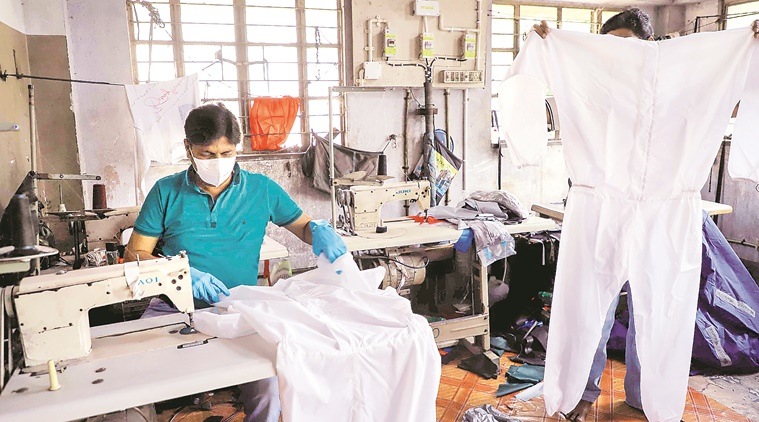 Protection suits being stitched at a workshop in Howrah district on Saturday. (PTI photo)
Protection suits being stitched at a workshop in Howrah district on Saturday. (PTI photo)
West Bengal Chief Secretary Rajiva Sinha on Saturday dismissed claims that the state government was withholding actual numbers about the number of people who have died of the novel coronavirus disease (COVID-19), and added that the focus was on identifying clusters and hotspots.
His statement came even as 11 new positive cases were reported.
While the media has reported at least seven COVID-19 deaths till now, the government has registered only three.
“In a time like this, nobody will increase or decrease figures. This is a very serious issue,” Sinha said at a press conference here, accompanied by advisory committee member Abhijit Chowdhury.
Sinha said the four extra deaths reported by the media “were co-morbid cases”. “Many people have come to our hospitals with pre-existing conditions,” he added.
“Infection rates are increasing and I will tell people that it may or may not increase in the next few days. Nobody knows how this is going to work. We are taking precautions,” he said.
On Saturday, the government released its daily bulletin about the pandemic situation after two days.
“If we are not putting something in the public domain, it means that the public does not need to know,” said the official. “Everyone need not know everything.”
Questioned about the government’s alleged failure to track suspected COVID-19 patients — especially those who attended the Tablighi Jamaat event in Delhi that is the source of scores of cases across India — Sinha said it was an impossible task since the state does not maintain travel histories of such patients.
“Giving such detailed information is not possible,” said the chief secretary.
“It is not possible to track travel details. It is not possible to track every case’s history. You should be more concerned with what the government is doing after knowing of a coronavirus case,” he added.
The bureaucrat said there were no reports of community transmission in the state, and added that fears of shortage of ventilators were unfounded.
Sinha pointed out that 24 COVID-19 patients were being treated at Beliaghata ID Hospital at present, and ventilators had not been used.
“We are well within the safe limit,” he added, referring to the COVID-19 cases. “It is not taking a disproportionate shape.”
Sinha said the government was focussing on bringing the situation under control, and expediting arrangements for personal protective equipment (PPEs) and medical facilities.
“We are identifying clusters and hotspots,” he added. “We are doing a four to five-layer mapping of the places where most cases are coming from; whether people are coming from abroad or outside the state.”
However, no separate record about foreign nationals admitted to hospitals was being maintained, Sinha said, adding: “Coronavirus will affect citizens and foreigners alike.”
The state has officially registered 49 positive cases, including the 11 reported since Friday. Though the Kolkata Port Trust said a supervisor at a company associated with it had tested positive, health authorities did not confirm it.
“He came back from Delhi on March 24 and no work has been done on the berth since that date due to the lockdown,” said Port Trust Chairperson Vinit Kumar. “However, he came to the port and spoke to people. So we had those people checked by our doctors and have kept them in quarantine. The ports were also sanitised.”
Although sources said this case was linked to the Delhi cluster, Kumar declined to confirm it. “We sanitised the port to ease people’s concerns. The port employees are still working but some contract workers on specific berths have not been coming in due to these reports.”
According to the health department bulletin, 52,080 people are under home observation at present, while 3,036 people have completed home quarantine. Samples have been collected from 1,042 people, 1,125 of whom have been isolated in hospitals. The authorities have discharged 786 people, while 339 still remain in hospital isolation. According to the chief secretary, the Indian Council of Medical Research has given approval to seven labs in the state to test COVID-19 samples.
Meanwhile, the health department’s Drug and Equipment Branch has issued a notice in an attempt to control the hoarding of 2 ply and 3 ply surgical masks, N95 masks, and hand sanitisers — all listed as essential commodities by the Ministry of Consumer Affairs.
The order, issued on April 3, will remain in force till June 30 unless otherwise amended. However, no curbs have been placed on the manufacturers of these essential commodities.
According to the notice, stockists and distributors are allowed to keep only 3,000 units of 2 ply and 3 ply masks, and 1,000 units of N-95 masks. The limit for hand cleansers is 100 litres.
Retailers can keep only 200 units of 2 ply and 3 ply masks, 100 units of N-95 masks, and five litres of hand sanitiser.